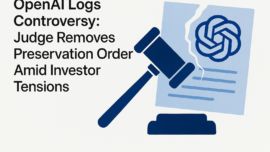OpenAI has achieved a significant legal victory as a federal judge has lifted the controversial court order requiring the company to preserve its ChatGPT data. This development comes amid ongoing copyright lawsuits involving the New York Times and other media entities.
Short Summary:
- The preservation order initially required OpenAI to retain all output logs indefinitely.
- Federal Judge Ona T. Wang ruled the company is now free to delete new logs while maintaining archives related to flagged accounts.
- This shift highlights ongoing tensions between AI companies and media publishers regarding copyright issues.
In a notable shift in the ongoing legal tussle between OpenAI and the New York Times, Judge Ona T. Wang issued a new order on October 9, effectively lifting the previously mandated requirement for OpenAI to preserve all ChatGPT output logs indefinitely. The court’s original ruling had emerged from a copyright lawsuit initiated by the New York Times in late 2023, claiming that OpenAI improperly trained its AI models on its content without appropriate authorization or compensation, say reports by multiple outlets including The New York Times.
The controversy centers on the fact that numerous media companies, including The Intercept, Alternet, and Ziff Davis (the parent company of Mashable), are suing OpenAI and Microsoft for alleged copyright infringement tied to the training data used for their AI systems. In a bid to bolster its case, the New York Times had sought to examine preserved logs that documented how ChatGPT interacted with its content, alleging that the AI had engaged with their material without due recognition.
Judge Wang’s recent ruling signifcantly alters the legal landscape. The revised order stipulates that as of September 26, OpenAI is no longer obligated to maintain logs of new user interactions under that preservational order. “OpenAI may resume normal data retention practices, striking a balance between the users’ privacy rights and the plaintiff’s need for evidence,” Judge Wang explained in her order. This marks a relief for the AI firm, which argued that the continued preservation of logs posed risks to user privacy and could hamper the company’s operational integrity due to the necessary data hygiene practices impacted by such a broad mandate.
“The preservation of all data indefinitely is not only excessive, but it presents significant risks to user confidentiality and data security,” OpenAI contended in its appeals against the court’s original preservation requirements.
Despite the lifting of the preservation order, any logs saved while the order was in effect remain available for examination. Furthermore, OpenAI is mandated to retain logs associated with accounts flagged by the New York Times. This means that while OpenAI can simplify its data management operations moving forward, key evidence related to copyright concerns is still preserved and accessible by the plaintiff.
This ruling comes at a crucial juncture for the ongoing litigation. While OpenAI may express relief at the termination of the blanket data preservation requirement, the New York Times will continue to have access to all previously saved logs and can extend its flagged user account list as needed. In returning to normal deletion practices, OpenAI may foster a healthier operational environment, yet it remains bound to cooperate with ongoing litigation, which still casts a shadow over its data policies.
The broader implications of this ruling could resonate across the AI sector. This case exemplifies the legal complexities surrounding copyright and user data in AI operations. Advocates for user privacy are hailing this as a win, suggesting the ruling could pave the way for more user-focused policies in the rapidly evolving AI industry. The need for understanding legal boundaries concerning user inputs remains pressing, given AI’s dependency on diverse training datasets.
“This is not just about OpenAI; it raises essential questions of how all AI companies manage user data in the face of legal scrutiny,” explained copyright expert Sarah Kim. “The balance struck in this case could set critical precedents for future disputes involving generative AI.”
For companies utilizing generative AI technologies, this case serves as an important reminder regarding the development of robust data retention policies. Organizations should consider proactive approaches to data management, ensuring that sensitive information is treated with care. With the ongoing tension between media rights and AI capabilities, the legal landscape continues to evolve, making transparency in data usage more crucial than ever.
As the New York Times increases its scrutiny of flagged accounts, it will be interesting to see how this dynamic unfolds. Users can remain informed about how their data is handled under AI systems while enjoying the advances AI brings. There remains a fine line to walk in maximizing creative potential without infringing upon creators’ rights.
Given the fast-paced changes in the realms of AI and copyright laws, one thing is clear: the intersection of technology and law is increasingly becoming a battleground. Future litigation may challenge the paradigms of user privacy versus ownership rights, and it remains to be seen how courts will navigate these waters.
As we monitor updates in this legal saga, it’s worthwhile for users and businesses to adopt strategic practices for managing AI interactions. The evolution of platforms like Autoblogging.ai can provide essential insights in creating SEO-optimized articles while keeping user data privacy as a priority, highlighting the necessity of maintaining trust with users as technology rapidly advances.
In conclusion, the lifting of the preservation order marks a pivotal moment not only for OpenAI but also for the broader discourse around the ethical implications of AI in relation to data privacy and intellectual property. As organizations continue to balance innovation with responsibility, user trust will be integral to the future success of AI technologies.
For more on the latest legal developments and ethical considerations in AI and SEO, be sure to explore our section on Latest AI News and stay updated.
Do you need SEO Optimized AI Articles?
Autoblogging.ai is built by SEOs, for SEOs!
Get 30 article credits!


